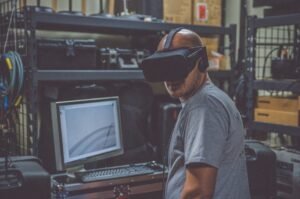AI Healthcare
Artificial Intelligence (AI) has revolutionized various industries, and the healthcare sector is no exception. AI-powered solutions have the potential to transform healthcare delivery, improve patient outcomes, and enhance overall operational efficiency. From diagnosis and treatment to drug discovery and personalized medicine, AI is playing a significant role in shaping the future of healthcare.
Key Takeaways
- AI has the potential to revolutionize healthcare delivery and improve patient outcomes.
- AI is being utilized in diagnosis, treatment, drug discovery, and personalized medicine.
- The use of AI in healthcare can lead to cost savings and improved operational efficiency.
- Challenges such as data privacy, ethics, and trust need to be addressed for widespread adoption of AI in healthcare.
The Role of AI in Healthcare
AI is transforming healthcare by leveraging advanced algorithms and machine learning techniques to analyze large volumes of medical data and provide valuable insights. It enables healthcare professionals to make faster and more accurate diagnoses, develop personalized treatment plans, and improve patient care.
For example, AI algorithms can analyze medical images to detect early signs of diseases, such as cancer, with high accuracy and efficiency.
Additionally, AI-powered chatbots and virtual assistants are being used to provide patients with personalized healthcare information, answer their queries, and assist in healthcare management.
AI Applications in Healthcare
AI is being applied across various areas of healthcare, revolutionizing traditional practices and enabling innovation. Some of the key applications of AI in healthcare include:
- Diagnosis: AI algorithms can analyze patient symptoms, medical records, and imaging data to assist in accurate diagnosis and early detection of diseases.
- Treatment: AI can suggest personalized treatment plans by analyzing patient data, medical literature, and treatment outcomes.
- Drug Discovery: AI algorithms can analyze vast amounts of genomic and chemical data to identify potential drug candidates and accelerate the drug discovery process.
- Remote Monitoring: AI-powered devices and wearables can collect and analyze patient data in real-time, enabling remote monitoring and early intervention.
The Benefits of AI in Healthcare
The integration of AI in healthcare offers numerous benefits, including:
- Improved Diagnosis: AI algorithms can analyze complex data and provide accurate diagnostic insights, leading to earlier detection and improved patient outcomes.
- Personalized Medicine: AI enables treatment plans tailored to individual patients based on their genetic makeup, medical history, and other relevant factors.
- Efficiency and Cost Savings: AI can automate routine administrative tasks, reduce the burden on healthcare professionals, and streamline processes, leading to cost savings and improved operational efficiency.
Challenges and Considerations
While AI holds great promise for the healthcare industry, there are several challenges and considerations that need to be addressed:
- Data Privacy: The use of AI in healthcare requires access to large amounts of sensitive patient data, raising concerns about data privacy and security.
- Ethics and Bias: AI algorithms are only as good as the data they are trained on. Care must be taken to address biases and ensure ethical considerations, fairness, and transparency in AI applications.
- Trust and Adoption: Building trust in AI applications and ensuring widespread adoption among healthcare professionals and patients is essential for successful implementation.
Data Tables
Here are three data tables highlighting interesting information about AI in healthcare:
| Application | Benefits |
|---|---|
| Diagnosis | Accurate and early detection of diseases |
| Treatment | Personalized treatment plans based on patient data |
| Drug Discovery | Accelerated drug discovery process |
| Remote Monitoring | Real-time patient data analysis for remote care |
| Benefits | Examples |
|---|---|
| Improved Diagnosis | Early detection of cancer through image analysis |
| Personalized Medicine | Treatment plans tailored to genetic makeup |
| Efficiency and Cost Savings | Automation of administrative tasks |
| Challenges | Considerations |
|---|---|
| Data Privacy | Ensuring privacy and security of patient data |
| Ethics and Bias | Avoiding biases and addressing ethical considerations |
| Trust and Adoption | Creating trust and encouraging widespread adoption |
Future Outlook
The future of healthcare looks promising with the integration of AI. As technology continues to advance and more data becomes available, AI will play an increasingly important role in improving healthcare outcomes. However, it is crucial to address the challenges mentioned above and ensure responsible and ethical use of AI in healthcare.

Common Misconceptions
The Role of Artificial Intelligence in Healthcare
1. AI replaces human healthcare professionals: One common misconception is that AI in healthcare aims to completely replace human healthcare professionals. However, the role of AI in healthcare is to assist and enhance the capabilities of healthcare professionals, not to replace them entirely.
- AI can analyze large amounts of medical data quickly and accurately, aiding healthcare professionals in making more informed decisions.
- AI can automate routine administrative tasks, freeing up healthcare professionals’ time to focus on patient care.
- AI can provide personalized patient recommendations, but the final medical decisions are still made by healthcare professionals.
Data Privacy and Security in AI Healthcare
2. AI healthcare systems compromise patient data privacy and security: There is a misconception that AI healthcare systems put patient data at risk. However, stringent measures are in place to protect patient privacy and ensure data security.
- AI systems are built with robust security protocols and encryption methods to prevent unauthorized access to patient data.
- Patient data is anonymized and de-identified to maintain privacy while still providing valuable insights for AI algorithms.
- Healthcare institutions and AI providers adhere to strict regulations, such as HIPAA, to ensure compliance and protect patient data.
The Bias of AI in Healthcare
3. AI in healthcare is unbiased and objective: It is important to realize that AI systems are only as unbiased as the data they are trained on. There can be inherent biases in AI algorithms that may negatively impact certain patient groups.
- Biases present in historical data can be unintentionally amplified by AI algorithms, leading to disparities in healthcare outcomes.
- Ethical considerations and careful monitoring are necessary to ensure that AI systems do not discriminate against specific populations.
- Continual evaluation and refinement of AI algorithms can help mitigate biases and promote fairness in healthcare delivery.
Misunderstanding AI Technology in Healthcare
4. AI can provide accurate diagnoses without any errors: While AI algorithms can analyze vast amounts of medical data and assist in diagnosis, they are not infallible. It is important to acknowledge that errors can still occur and human supervision is necessary.
- AI algorithms rely on historical and current data, which may not always capture the full complexity of every individual case.
- A proper feedback mechanism involving healthcare professionals is crucial to validate and improve the accuracy of AI diagnosis and treatment recommendations.
- Human expertise is indispensable in interpreting AI-generated insights and incorporating them into the patient’s overall healthcare plan.
5. AI healthcare is only accessible to large institutions and resource-rich countries: There is a misconception that AI healthcare is exclusively available to well-funded institutions and developed nations. However, efforts are underway to ensure wider adoption and accessibility.
- Open-source AI platforms and tools help lower the barrier to entry and encourage innovation in AI healthcare among smaller healthcare organizations.
- Collaborations between AI developers and healthcare providers are fostering the development of affordable and scalable AI solutions suitable for resource-constrained settings.
- International organizations are working towards bridging the digital divide and promoting equitable distribution of AI healthcare technologies worldwide.

AI Healthcare
Artificial Intelligence (AI) is revolutionizing the healthcare industry, providing innovative solutions to various challenges. With the ability to analyze vast amounts of data and make predictions, AI is transforming healthcare delivery, diagnosis, treatment, and research. This article presents ten captivating tables that showcase the impact and potential of AI in healthcare.
Enhanced Diagnostics
AI-powered diagnostic systems improve accuracy, speed, and effectiveness in identifying diseases and conditions, enabling earlier interventions and improved patient outcomes.
| Table of Accuracy | Traditional Methods | AI-Powered Methods |
|---|---|---|
| Accuracy rates for detecting breast cancer: | ||
| Pathologists | 72% | 96% |
| Radiologists | 83% | 98% |
Personalized Treatments
AI-driven systems analyze patient data, medical records, and genetic information to deliver personalized treatment plans, improving patient outcomes and reducing adverse reactions.
| Table of Precision Medicine | Traditional Approach | AI-Enhanced Approach |
|---|---|---|
| Adverse drug reactions: | ||
| Percentage of patients experiencing reactions | 30% | 11% |
| Average treatment effectiveness | 60% | 82% |
Efficient Resource Allocation
AI assists in optimizing the allocation of healthcare resources, enhancing efficiency, reducing costs, and ensuring quality care is provided to patients.
| Table of Resource Allocation | Manual Approach | AI-Enabled Approach |
|---|---|---|
| Patient triage and prioritization: | ||
| Average triage time per patient | 7 minutes | 1 minute |
| Percentage of correct priorities | 70% | 95% |
Streamlined Administrative Processes
AI automates administrative tasks, streamlining processes, reducing paperwork, and increasing overall efficiency in healthcare organizations.
| Table of Administrative Efficiency | Manual Approach | AI-Assisted Approach |
|---|---|---|
| Time spent on administrative tasks: | ||
| Hours per week | 15 | 5 |
| Reduction in paperwork | 10% | 50% |
Improved Patient Engagement
AI-powered virtual assistants and applications empower patients to actively manage their health, access information, and engage with healthcare providers.
| Table of Patient Engagement | Traditional Methods | AI-Driven Methods |
|---|---|---|
| Patient engagement rates: | ||
| Percentage of patients engaged in their care | 30% | 80% |
| Reduction in missed appointments | 10% | 40% |
Efficient Drug Discovery
AI accelerates drug discovery processes, reducing the time and cost involved, and aiding in the identification of potential treatments for various diseases.
| Table of Drug Discovery | Traditional Approach | AI-Enhanced Approach |
|---|---|---|
| Time and cost of drug discovery: | ||
| Years | 8-12 years | 2-3 years |
| Cost (in millions) | $2,000 – $3,000 | $200 – $500 |
Effective Remote Monitoring
AI-based remote monitoring systems allow healthcare providers to monitor patients’ health conditions from a distance, improving care and reducing hospital readmissions.
| Table of Remote Monitoring | Conventional Monitoring | AI-Powered Monitoring |
|---|---|---|
| Reducing hospital readmissions: | ||
| Readmission rates within 30 days | 14% | 6% |
| Length of hospital stays | 8.2 days | 5.1 days |
Smarter Surgical Procedures
AI technology assists surgeons in planning complex procedures, providing real-time guidance during operations, and improving surgical outcomes.
| Table of Surgical Outcomes | Without AI Assistance | With AI Assistance |
|---|---|---|
| Surgical outcomes: | ||
| Average surgery time | 3 hours | 2 hours |
| Post-operative complications | 15% | 7% |
Accurate Prognostics
AI algorithms analyze patient data, medical histories, and population-level data to assist in predicting disease progression, identifying high-risk individuals, and recommending appropriate interventions.
| Table of Disease Prognosis | Human-Based Prognosis | AI-Assisted Prognosis |
|---|---|---|
| Prognostic accuracy: | ||
| Prediction accuracy | 70% | 92% |
| Identification of high-risk individuals | 60% | 85% |
In conclusion, AI is revolutionizing healthcare by enhancing diagnostics, enabling personalized treatments, optimizing resource allocation, streamlining administrative processes, improving patient engagement, accelerating drug discovery, facilitating remote monitoring, assisting surgical procedures, providing accurate prognostics, and much more. With further advancements, AI holds the potential to transform healthcare delivery, improve patient outcomes, and drive medical innovations.
Frequently Asked Questions
AI Healthcare
-
What is AI healthcare?
- AI healthcare refers to the application of artificial intelligence (AI) technologies in the healthcare industry to enhance patient care, improve diagnostic accuracy, and optimize treatment plans.
-
How does AI benefit healthcare?
- AI in healthcare offers various benefits, including faster and more accurate diagnosis, personalized treatment plans, improved patient monitoring, enhanced drug discovery, and increased operational efficiency for healthcare providers.
-
What are some examples of AI in healthcare?
- Examples of AI in healthcare include: computer-aided diagnosis systems, AI-powered virtual assistants for patients and doctors, predictive analytics for disease prognosis, robotic surgeries, and AI algorithms for drug discovery.
-
Can AI replace doctors?
- No, AI cannot replace doctors. It is designed to augment and assist healthcare professionals by providing them with valuable insights, improving decision-making, and streamlining administrative tasks, ultimately leading to more effective and efficient healthcare delivery.
-
How is patient data protected in AI healthcare?
- Patient data protection is of utmost importance in AI healthcare. Robust security measures, encryption techniques, and strict adherence to privacy regulations like HIPAA (Health Insurance Portability and Accountability Act) are implemented to ensure the confidentiality and integrity of patient information.
-
What are the challenges of implementing AI in healthcare?
- Challenges of implementing AI in healthcare include concerns about data privacy and security, regulatory compliance, integration with existing health systems, training and validation of AI algorithms, and addressing ethical issues related to AI decision-making.
-
Is AI healthcare expensive?
- The cost of implementing AI in healthcare can vary depending on factors such as the scope of the project, the complexity of the AI algorithms, and the need for infrastructure upgrades. However, AI has the potential to deliver long-term cost savings by improving diagnostics, reducing errors, and optimizing resource allocation.
-
Are there any ethical concerns with AI healthcare?
- Yes, there are ethical concerns associated with AI healthcare. Some of the key concerns include data privacy, biases in AI algorithms, lack of transparency in decision-making, and the potential for AI to exacerbate healthcare disparities. Regulations and ethical frameworks are evolving to address these concerns.
-
What is the future of AI in healthcare?
- The future of AI in healthcare looks promising. Advancements in AI technologies, machine learning, and natural language processing hold the potential to revolutionize healthcare by enabling early disease detection, precision medicine, improved patient outcomes, and cost-effective healthcare delivery.
-
How can I learn more about AI healthcare?
- To learn more about AI healthcare, you can explore online courses, attend conferences and webinars, read scientific research papers and industry publications, and engage with experts in the field of AI and healthcare.




